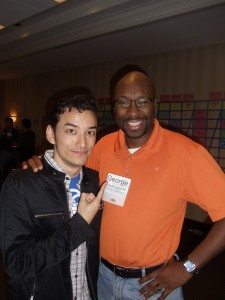
- Making your voice over demo too soon. Yes, you can spend a couple of thousand dollars and make your demo any time you want, thankyouverymuch. You could conceivably have one made by the end of this week. Of course, if you haven’t prepared, you haven’t practiced, you haven’t had some coaching, you haven’t found out what your “money” voice is, you haven’t picked out scripts appropriate to your voice…you are going to waste a few things. Your money, your time, and the time of the studio you engaged to get the demo made in the first place. There is no rush: you have time to get these things done. Take it.
- Making your first demo on your own. So rather than waste your money and time at a recording studio, you figure “Hey, I have the programs I need. I’ll just whip up that demo myself, get it out there, and let the jobs roll in!” Erm, no. You already have the burden of getting the script interpretations right. You really want to take on mic placement, editing, background music and sound effect selection, engineering, timing and all that plus more by yourself? Some things you should leave to the professionals. Recording your first demo is definitely one of them. Experienced, professional studios have the skills, the royalty free music and effects libraries, the experience and the overall wherewithal to make you look your absolute best in the recording. Down the road, you may be able to do some of this yourself, with training and experience. But do not, under any circumstances, make your first demo on your own. You will pretty much guarantee it will be listened to for 5 seconds and tossed. If you go to Voice123, Voices.com, or any of the P2P sites, you can find plenty of demos that simply should not be used as a representative of anyone’s abilities. Don’t be one of them. Get it right the first time.
- Assuming all you need is an agent for voiceover success. There are hundreds, nay, thousands of people out there who operate as voiceover agents. And for every one of them, there are many more times that amount of voice artists. Your agent can and will get you access to auditions you may not have access to as a layman. But they cannot and will not be your only source of work, unless you have that kind of bolt-from-the-blue “success” reserved for Ted Williams. A note on Ted; he did get a national commercial gig for Kraft. If it went according to rates I am familiar with, he may have made upwards of $2000 for that job. And that’s it. He’s still trying to put his life together, and I wish him all the best. But his kind of success didn’t necessarily result in long term productivity. Your agent can work with you to achieve that, but you need to be willing to invest your own time in looking for contacts and work wherever you are, and just add the agent into your toolbox. Speaking of looking for your own work…
- Assuming all you need is Pay-to-Play sites for success. The argument remains the same; multiple sources and multiple paths are the way to go. Many people are successful in finding work through the P2Ps. Some people eschew their use entirely. You have to make that decision yourself. But don’t make that decision that you are going to get your work exclusively from that channel, for the same reasons you shouldn’t assume your agent is going to get it all for you. Here’s a sobering note: on Voice123, if I check for voice artists with the following criteria; commercial, middle age male, English – North American, no union necessary in the United States, I find 1,158 voice artists. Competition for gigs will be challenging. And you may win some. But this isn’t going to be the only way you get work, unless you are planning on eating quite a bit less than you do now. Your success is directly connected to your ability and will to network, engage, help, and listen.
- Losing patience with the process. You simply can’t do this if you want success. Today may not be the day you win that regional network gig, or that national spot for McDonalds. Tomorrow might be. But in between, you want to fill the space with phone messages for Joe’s Dry Cleaners or Aunty Em’s Frozen Toast on a Stick Shoppe. There is always the chance you cannot move forward with this career the way you want. From experience, I can tell you the readjustment period can be rough. But folks, these things take time. You have to keep working, keep reaching out to potential clients, keep reaching out to experienced voice over talents for advice. Patience, grasshopper.
Filed under: Agents, Career Development, Marketing, Sales and Contacts, Networking | Tagged: demos, music, patience, professional, rush, sound effects, studios, the long game | Leave a comment »









